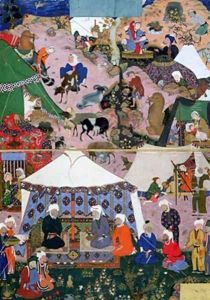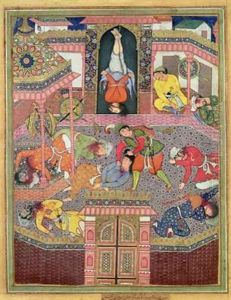Mir Sayyid'Ali Paintings
Mir Sayyid Ali was a prominent Persian miniaturist and painter who played a significant role in the development of the Mughal school of painting in India. Born in Tabriz, Persia (now Iran) in 1510, he hailed from a family of artists and was trained by his father, who was also a well-regarded painter. His early life was marked by the rich cultural and artistic environment of the Safavid court, which was known for its patronage of the arts, including the intricate and detailed miniature painting that flourished in Persia during this period.
In 1545, Mir Sayyid Ali embarked on a transformative journey to India, alongside fellow artist Abd al-Samad, at the invitation of the Mughal Emperor Humayun, who was in exile in Persia at the time. This move was pivotal for the development of Persian-influenced art in the Indian subcontinent. Under Humayun and later his son Akbar, Mir Sayyid Ali became an instrumental figure in establishing the Mughal painting style, which combined Persian, Indian, and European elements into a unique and vibrant artistic expression.
Throughout his career in the Mughal court, Mir Sayyid Ali contributed to several significant projects, including the illustration of manuscripts and the decoration of royal palaces. His works are noted for their delicate detail, rich color palette, and the incorporation of naturalistic elements, a departure from the more stylized Persian miniatures. He was also a mentor to many artists, thereby ensuring the continuation and evolution of the Mughal painting tradition.
Mir Sayyid Ali's influence extended beyond his lifetime, impacting the development of Indian art for centuries. He died in 1572, leaving behind a legacy of artistic innovation that reflects a fusion of cultures and traditions. His contributions to the Mughal school of painting have been celebrated in art history as a testament to the cultural exchange between Persia and India during the 16th century, and his works continue to be admired for their beauty and historical significance.

